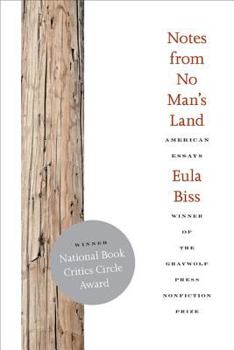Notes from No Man's Land: American Essays
Select Format
Select Condition 
Book Overview
In a book that begins with a series of lynchings and ends with a series of apologies, Eula Biss explores race in America. Her response to the topic is informed by the experiences chronicled in these... This description may be from another edition of this product.
Format:Paperback
Language:English
ISBN:1555975186
ISBN13:9781555975180
Release Date:February 2009
Publisher:Graywolf Press
Length:230 Pages
Weight:0.74 lbs.
Dimensions:0.8" x 5.5" x 8.1"
Customer Reviews
4 ratings
James Baldwin might find this a decent primer for a white reader
Published by Carl Weis , 3 years ago
Sometimes truth creeps up on you so quietly before you can say boo, tears are welling on your lower lids. It happened to me before I had reached page 15 of Notes from No Man's Land. This writer has an uncanny gift to weave the narrative of her own unique life into a tapestry at once historic and profoundly philosophical. A good writer calls us in unexpected ways to mine deeper parts of ourselves. Eula Biss is a VERY good writer. Even if you never heard her name before you open this book of very personal essays involving the very volatile and difficult subject of race in America, you will be called to self examination asking questions of your own heart, soul and history that sometimes have no comfortable answers.
A must read
Published by Thriftbooks.com User , 14 years ago
This is a thoughtful, thought provoking and insightful book. Be sure and read the last chapter where the author discusses what inspired many of the essays included in the book. We had our book group read it. It was rated highly by every person in the group.
No leaf unturned
Published by Thriftbooks.com User , 15 years ago
In each essay, in prose that refuses to draw attention to itself, Biss methodically marches us to the edge and over, into the dark and seldom recognized truth about the state of race relations in America. I'm amazed by her unflinching eye and its deadly accuracy.
Eula Biss: Essayist extraordinaire
Published by Thriftbooks.com User , 15 years ago
Several weeks ago, I happened upon Eula Biss reading her essay, "Time and Distance Overcome" on C-SPAN's BookTV. She was in the midst of the essay, which uses telephone poles to convey several themes about America, including the inherent racism represented by our history. The telephone pole allowed wires to be strung, linking communities and eventually the entire country. We now view this and Alexander Graham Bell's invention of the telephone as wondrous things. Biss points out in her essay that Americans at that time opposed telephone poles vociferously. She writes about the New York Times in 1889 reporting a "War on Telephone Poles." Biss tells us that as soon as the telephone company erected a new pole, home owners and business owners would saw it down, even resorting to defending their properties from telephone poles with rifles. According to Biss, newspaper editorials at the time considered telephone poles as contributors to urban blight. Telephone poles also made convenient stations upon which to lynch blacks, something I never learned in history class, and wouldn't have known, if this essay by Biss, contained in her collection of essays, Notes from No Man's Land: American Essays. Biss doesn't blame telephone poles. They were merely an instrument, a practical one at that given that they were tall and straight, had a cross bar, and they stood in public places, making them great for humiliation and degradation, key elements of lynchings. Writing about telephone poles and lynchings might seem perverse, and evoke discomfort from readers, Biss conveys something about America in this essay, about racism from our nation's past that is not common knowledge, even though telephone poles are ubiquitous. Her essays are like that. She looks at things, like race in America, and the prevalence of fear in our country, through a lens somewhat altered from the norm. We also learn from Biss that her father told her that her grandfather was a telephone lineman and "broke his back when a telephone pole smashed him against the road." While all of the essays have a thematic center, which is race in America, a subject fraught with peril for any writer, Biss never comes across as heavy-handed, or haranguing readers, and the essays aren't about ideological axe-grinding. Throughout "Notes from No Man's Land," Biss regularly shows her adeptness and skill as a writer, tackling tough subjects in each essay, but always with a twist or turn that took you somewhere different than you originally thought you were going. In the process, you admired the journey, and how Biss made you think about her points. This is Biss's first full-length work, made possible when she won Graywolf's Nonfiction Prize for 2008. I'm sure this will be the first of many books from Biss, as this first book of essays is a winner.





